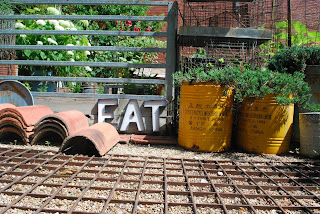I'm really looking forward to the Urban Grown tour this summer! The girls and I went two years ago and we had such a nice time. The first time I went was 2009, back before Cultivate KC was even called Cultivate KC! Now the organization is celebrating their 10 year anniversary, and I was asked to write a piece for their Urban Grown newsletter that went out in March. Here it is...
Looking Back, Looking Forward: Ten Year of Local Food
By Emily Akins, Kansas City Food Circle.
ORIGINALLY PUBLISHED HERE.
Along that path I found out about the Kansas City Center for Urban Agriculture, which was renamed Cultivate Kansas City in 2011. I signed up to take a class at Whole Foods, taught in part by Katherine Kelly, co-founder of Cultivate Kansas City, which included a farm tour of what is now called the Gibbs Road Farm. By then I had already begun working as a volunteer for the KC Food Circle, a non-profit that connects eaters with local, organic, and free-range farmers and was beginning to find my way around the great resources available in Kansas City. And I had already learned to appreciate where my food comes from.
When I heard about KCCUA’s Urban Farms and Gardens Tour I decided to sign up to help. It was winter. The days were short and the vegetable crispers in my fridge were empty, but I began meeting regularly with the amazing volunteers who were planning and preparing the 2009 Urban Farms and Gardens Tour. Before I knew it, it was a hot summer day, the growing season was in full swing, and I was driving around from farm to farm helping to keep the tour running smoothly. I was also enjoying my opportunity to learn about urban agriculture. I went to small farms, large farms, urban farms and backyard farms. Each one provided a wealth of food and information.
I wasn’t the only one who responded so positively to the tour. It has grown each year – as I think much of the local food movement has in Kansas City. With the KC Food Circle, we’ve seen a steady increase of farmers and eaters who want to become part of our organization, and great support from our volunteers and our community partners like Cultivate Kansas City.
I’ve learned a lot and enjoyed food so much in the years since my first season. And I inadvertently became much healthier. I hadn’t set out to eat more whole foods, but buying directly from our local farmers encouraged me to do so. I think this makes my family and me healthier but I also think it makes our community healthier.
This is the beauty of food grown so close to home -- I know the people who grow my food. They have taught me how to store, prepare, and preserve all the delicious produce that comes to me fresh from their farm every week. I can even visit the farms and see with my own eyes where my food comes from. Best of all they have provided me with confidence. I know that their sustainable farming practices both enrich the earth and make for delicious, fresh produce. And I know that each crop and each farmer and each urban farm is enabling Kansas City to grow stronger every year.
I am excited to see the growth that has already happened in Kansas City and I am even more excited to see where Kansas City will be in the next 10 years as more farmers farm, more eaters eat, and as the efforts of Cultivate Kansas City continue to fill our urban core full of delicious food.
###
Here are some of my favorite pics from the Urban Grown Tour in 2013. All the pics are HERE.













